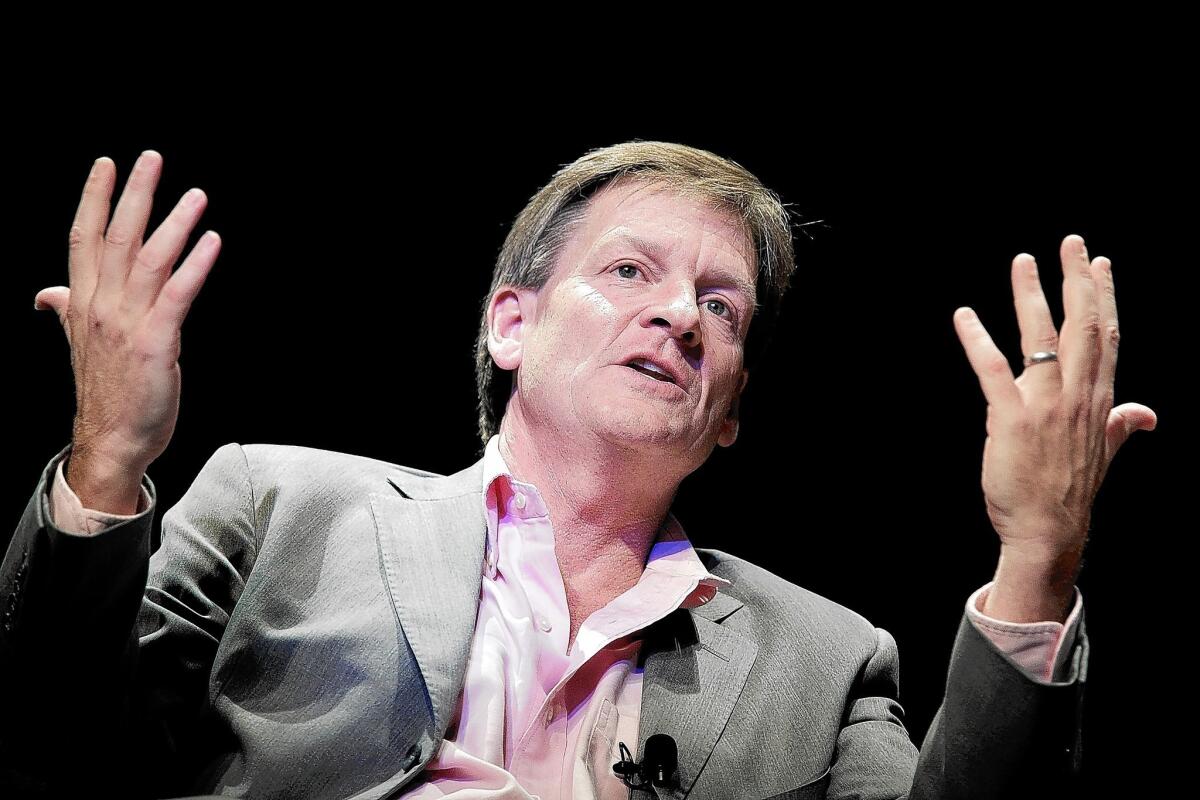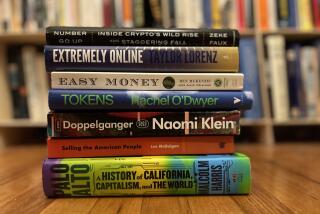Michael Lewis’ ‘Flash Boys’ focuses on Wall Street computer scheme

There’s something delightfully strange and counterintuitive about the way time operates in the opening chapters of Michael Lewis’ new book, “Flash Boys: A Wall Street Revolt.”
Lewis describes a new kind of Wall Street gold rush. In the entirely automated, pre- and post-crash stock market of the first two decades of the 21st century, human traders have become superfluous. Stocks are bought and sold inside computers, and a new brand of high-frequency trader is making a fortune thanks to a precious new commodity — speed. Suddenly, a millisecond (one thousandth of a second) is worth millions of dollars.
In the crazy, ever-faster new world Lewis describes, a small number of new firms begin to wrest control of the market circa 2006 by staying a single millisecond, or even one millionth of a second, ahead of big, established Wall Street institutions.
“The financial markets were changing in ways even professionals did not fully understand,” Lewis writes. “Their new ability to move at computer, rather than human, speed had given rise to a new class of Wall Street traders. ... People and firms no one had ever heard of were getting very rich very quickly.”
Lewis is the author of several previous bestselling nonfiction books, some of which have been made into films, including “The Blind Side” and “Moneyball.” His new book also has a deeply cinematic (and conventionally Hollywood) feel as Lewis follows a group of Wall Street misfits and nerdy tech guys who try to make sense of what, exactly, is happening to the stock market. And to fight back.
“Flash Boys” would have you believe what happens next is a kind of uprising. But the outrage here is controlled and ultimately based on self-interest — and has absolutely nothing in common with the biting Wall Street critique put forward by the Occupy movement at about the same time.
Still, as in a smart movie thriller, our hero-protagonist is an unlikely and compelling one, an ordinary man thrust into extraordinary circumstances. Brad Katsuyama is a Canadian trader of Japanese descent who works for the Royal Bank of Canada, where the corporate culture is “Canada nice.”
Katsuyama is sent from Toronto to New York as part of RBC’s “big push” to join the high-rolling Wall Street players. After a while, he notices something odd when he presses the key on his computer terminal to execute a trade — somehow, the market seems to be reading his mind, with stock values shifting the instant he presses the key, costing him millions. Perplexed, Katsuyama consults RBC’s tech guys, explaining to them “that the market on his screens used to be a fair representation of the actual market, but that now it was not.” Katsuyama was being “front-run,” with some other trader “in effect noticing his demand for stock on one exchange and buying it on others in anticipation of selling it to him at a higher price.”
Lewis, as always, is exceedingly good at describing the complexities and absurdities of the subculture he portrays here. The new Wall Street, like the old one, creates obscene levels of wealth. But now it’s based on increasingly complex and mysterious financial instruments even top Wall Street executives don’t fully understand.
Katsuyama soon realizes that most people on Wall Street don’t understand how a computer trader can exploit the slightest time advantage over another computer. Wall Street was having its collective pocket picked by high-frequency traders. “What had once been the world’s most public, most democratic, financial market had become, in spirit, something more like a private viewing of a stolen work of art,” Lewis writes. The men Katsuyama ends up working with are (alert the casting department) an odd assortment, including a tech guy from Ireland and a “product manager” from a family of Staten Island firefighters.
The book’s subtitle, and Lewis’ quick descriptions of the lives and motivations of Katsuyama’s team, suggests he sees them as “rebels” driven by a kind of altruism. But the “revolt” metaphor feels forced.
For starters, Katsuyama’s foes, the high-frequency traders (or HFT), aren’t really the Wall Street establishment. The HFT’s strategies are gaming the system and siphoning money from big banks and brokerages too. What Lewis is describing is more of a counterinsurgency as both Katsuyama and the big banks and brokerages develop their own strategies for fighting back — and for making money in the new speed-of-light market.
And Katsuyama’s team isn’t exactly a gathering of bohemian ascetics. Yes, some are outraged at the greed of the HFTs, but they’re also ambitious and angry that someone has changed the rules about making money. In the end, they and Katsuyama move not to overturn the establishment but to bring order and a modicum of transparency back to Wall Street.
After failing to get government regulators to do anything, Katsuyama’s big idea is to create a new exchange in which the HFT tactics won’t work. He seeks to make big Wall Street firms his allies in this endeavor, but to do so he needs “to prove to investors that an explicitly fair exchange yielded better outcomes for investors than all the other exchanges.” The ending of “Flash Boys” will make you remember the final act of several of the new technology movie dramas of recent years, as visionaries stand by their computer screens, watching the world change before their eyes.
Still, “Flash Boys” is a deeply entertaining book, and one that illuminates how much our world has changed in less than a decade. This story of a broker who wanted to keep the buying and selling of stocks “Canada nice” illuminates the frightening truth that very few people understand how much more treacherous the trillion-dollar sea called Wall Street has become.
Flash Boys
A Wall Street Revolt
Michael Lewis
W.W. Norton: 274 pp., $27.95
More to Read
Sign up for our Book Club newsletter
Get the latest news, events and more from the Los Angeles Times Book Club, and help us get L.A. reading and talking.
You may occasionally receive promotional content from the Los Angeles Times.








